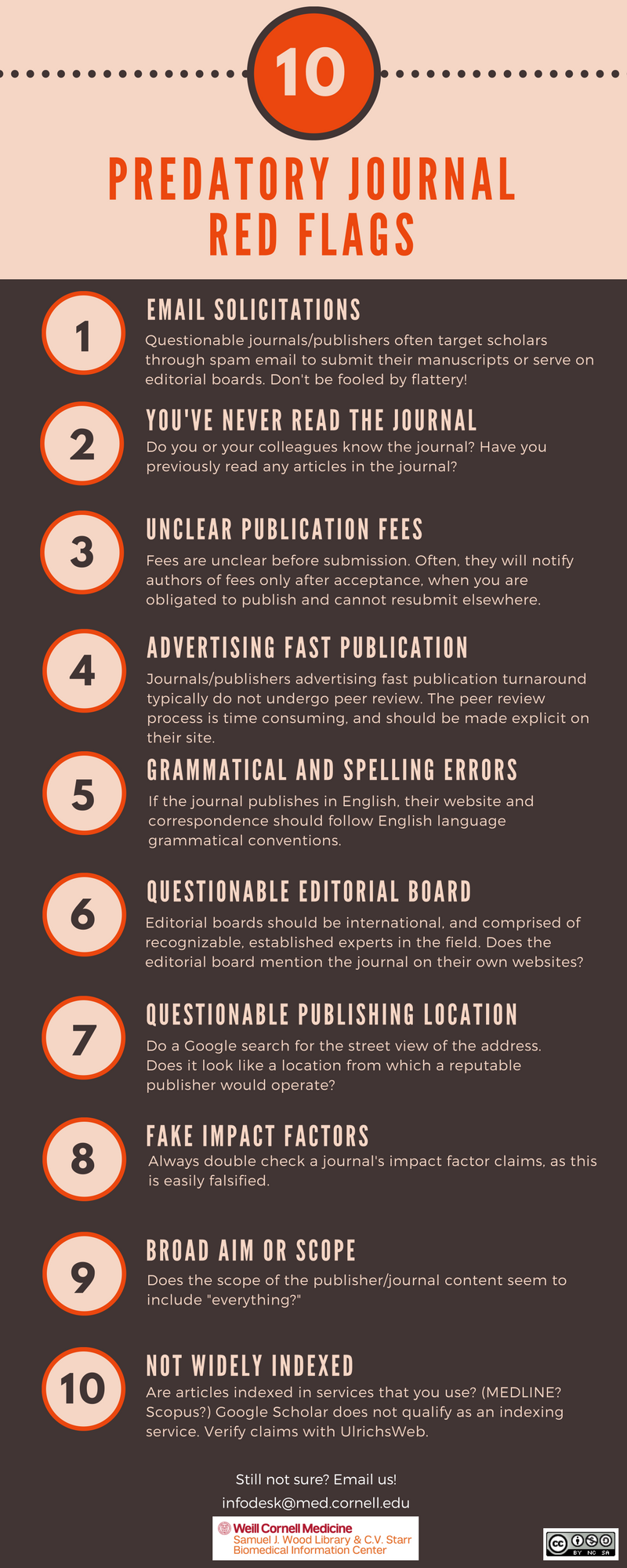Predatory journals or publishers have taken advantage of the pay-to-publish model, scamming authors out of publishing fees.
Predatory journals exist as a business, not to promote scholarly discourse or foster high quality research. Promising fast publication turnaround, these journals have little to no peer review, resulting in low quality articles. Repeated publication in predatory outlets can be potentially harmful to a researcher's reputation.
Once a submitted article is accepted for publication, an author cannot resubmit or republish elsewhere. Simultaneous submission (submitting to more than one journal at a time) is also considered unethical. With this in mind, it is important to carefully evaluate each journal before selecting one for publication, regardless of its supposed illegitimacy. These appraisal skills should be applied before every submission, in order for an author to make the greatest impact with their work.
The following observations do not necessarily mean that a journal/publisher is predatory. However, they should raise some red flags, requiring further investigation before a decision is made by the author. If you are unsure about a journal's validity, do not submit. If the image doesn't load, please go to it directly here: https://library.weill.cornell.edu/sites/default/files/redflags.png.

An easy-to-use checklist that researchers can refer to when they are investigating whether a journal can be trusted.
Bibliographic and access information about serials published throughout the world, covering all subjects. Entries provide pricing, subscription and distribution details as well as publisher and editor contacts.
Search for papers published in prospective journals that have been flagged as potentially problematic using a growing number of quality indicators.
The Journal Blacklist specialists analyze over 60 behavioral indicators to keep the community aware of the growing threats and to keep academia protected from exploitative operations by predatory journals.
Resource for journal evaluation, using citation data drawn from over 8,400 scholarly and technical journals worldwide. Coverage is both multidisciplinary and international, and incorporates journals from over 3,000 publishers in 60 nations. Contains citation data on journals, and includes virtually all specialties in the areas of science, technology, and the social sciences. JCR Web shows the relationship between citing and cited journals.
Indexes high quality, peer reviewed Open Access research journals, periodicals and their articles' metadata. The Directory aims to be comprehensive and cover all open access academic journals that use an appropriate quality control system, and is not limited to particular languages or subject areas. The Directory aims to increase the visibility and ease of use of open access academic journals—regardless of size and country of origin—thereby promoting their visibility, usage and impact.
One of the goals of OASPA is to promote best practices for maintaining and disseminating OA scholarly communications, and ethical standards of publishing. Applicants must be judged to meet a set of OASPA Membership Criteria and all new applications are screened by the Membership Committee in an effort to determine whether the applicant operates with integrity and is genuinely committed to open access publishing.
Journals in the developing world face challenges in becoming known and respected in the international research landscape.The JPPS framework provides detailed assessment criteria for the quality of publishing practices of journals in the Global South and is initially being used to assess the journals hosted on JOL platforms, a host for journals in Africa, Asia, and Latin America.
Through best practice guidelines and education initiatives, COPE is committed to support editors, publishers and those involved in publication ethics with the aim of moving the culture of publishing towards one where ethical practices becomes the norm, part of the publishing culture.